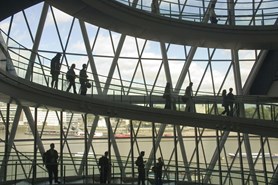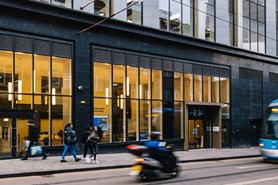There are just six months left to go until the Talisker Whisky Atlantic Challenge (TWAC). Our friends in Team Peninsula are rowing 3,000 miles across the Atlantic to raise awareness of the ever-increasing volume of plastics polluting the world’s oceans. We checked in with them to learn about their progress.
If you’re going to row from La Gomera in Spain to Antigua in 42 days, you need a sturdy boat, and a whole lot of other preparation. The team is already halfway to securing its target expedition cost of £140,000 – £80,000 of which will go to the team’s selected marine conservation organisation upon completion of the expedition.
The brave team of three have shared with us a breakdown of their process.
How are you progressing with getting the boat and equipment in order?
We’ve already raised a whopping £5,931 towards the expedition, which has helped us get a brand new R45 Elite ocean rowing boat built (we nicknamed it the ‘Dirty Oar’). We also got our hands on fixed equipment, including VHF radio, a navigation / chart plotter, automatic identification system, and most importantly, the water maker!
There’s still more equipment to acquire over the next couple of months – most importantly safety (it would be a bad idea to embark without a life raft, life jackets, harnesses, etc.), as well as practical items like cooking, sleeping, etc. We look forward to using our training rows to see what works for us and what doesn’t.
Just how much will you need to eat to sustain yourselves on the journey?
To make the journey, we have to expend around 7,000 calories daily (per rower!), while consuming about 5,000 per day! (that results in rowers losing around 5 – 12kg during the journey!). That includes:
• Three meals of around 800 calories each
• A snack pack of bars, nuts, etc.to fuel them while rowing and aid with the recovery (about 3,000 calories per rower).
What sort of training do you have to do beforehand?
TWAC isn’t something you just sign up for. You have to log at least 120 hours of training on the boat to be used for crossing before you can qualify for the race.
Rowing across the Atlantic requires just as much mental preparation as it does physical, which is why we’re attending regular psychological-focused calls that let us express fears, hopes, dreams, and expected high and lows. We are working very hard to brainstorm out every eventuality that will help mentally prepare us for the challenges ahead. Part of that involves also completing a compulsory 7-day pre-qualifying course, covering short-range radio, sea survival, first aid, essential navigation, seamanship, and exams.
Will you in be contact with anyone during the journey?
A lot of things can go wrong during a 42-day voyage, and weather’s an important factor, so yes, we will be in daily contact with experienced weather router Stewart Robertson for reports on the prevailing winds, weather conditions, and to help plot the best course. Stewart will be one of our only regular lines of communication during the voyage.
About the team
Team Peninsula’s members are Sam from Peninsula Real Estate in the UAE, and Will and Toby in the United Kingdom. Sam and Will are ultra-endurance athletes and Toby is an Army veteran. Combining their quest for adventure with a desire to rescue the oceans from plastic pollution, Team Peninsula have set to challenge their mental and physical strength while supporting this critical cause.
The team is backed by 5x Olympic Gold Medallist and former Gleeds Ambassador, Sir Steve Redgrave.
About the charities/non-profits
Plastic Oceans UK have been the experts on plastic pollution for a decade, starting with the award-winning documentary “A Plastic Ocean”; named by Sir David Attenborough as “one of the most important films of our time”.
Azraq is the Arabic word for “Blue”. Its mission is to end the destruction of habitat and wildlife in the world’s oceans in order to protect ecosystems and species.
What are you looking forward to about being out on the ocean?
Being out in the middle of the ocean has some benefits. The lack of light pollution results in a sky full of stars; the Milky Way is just a bright band across the sky!
Sightings of dolphins and whales are also common along the journey, with one team having seen a pod of 300-400 dolphins! The animal that scares us the most, though, is the killer whale. They can be really intimidating, especially if they start playing with the boat.
If you wish to contribute to Team Peninsula's efforts click here.

Graham Harle
Chief Executive Officer
- graham.harle@gleeds.com
- +44 (0)207 631 7000
Eight million tonnes of plastic enters the oceans each year. If waste management practices don't improve, scientists predict this amount could increase tenfold by 2025.



